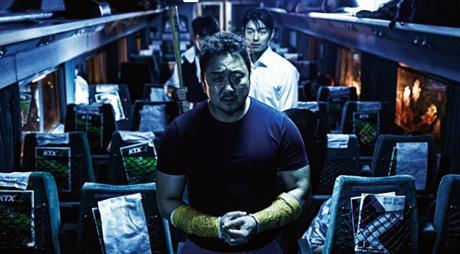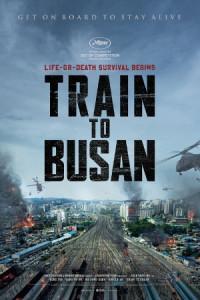
Review: It was all rooting to a satire towards consumerism, as proclaimed by George Romero, zombie sub-genre has evolved to become an opposite phenomenon: a box office digger. World War Z is a fine example of such phenomenon; and what happened to South Korean zombie apocalypse hit shows a similar symptom. Apparently, director Yeon Sang-ho delivers a claustrophobic zombie apocalypse drama in a train to this year's top of domestic highest grossing movie list.
Since the opening, Train to Busan never attempts to appear exuberant nor to refute its status as Korean mainstream movie. As a zombie movie, this doesn't deliver new innovation except the setting and one-place dynamics which might remind you to Bong Joon-ho's Snowpiercer. Yet, such modesty is what actually makes this movie emotionally strong - with tendency to become melodrama.
Train to Busan opens with a scene involving a truck driver and people in hazmat discussing something which might indicate nuclear power plant leak. But, this movie isn't hasty to get into the zombie apocalypse; instead, it jumps to the life of a fund manager, Seok-woo (Gong Yoo), whose divorce is on the run when his daughter Su-an (Kim Su-an) asks to meet her mother in Busan as a birthday present. Reluctantly, Seok-woo grants her wish and they both leaves with a KTX to Busan.
BACA JUGA: Review Train to Busan dalam Bahasa Indonesia
When it comes to the long-awaited outbreak, it doesn't appear massively; but, still, it threatens with uncomfortable feeling as an infected girl staggers into the train. As expected, the infection spreads rapidly and overwhelms the passengers. Without further warning, train wagons suddenly are cramped with people trying to survive and zombies trying to prey helpless victims.
In such grave danger, Train to Busan leads audiences into rooting some essential characters including Seok-woo and Su-an; a husband and his pregnant wife; two elderly sisters; a group of high school baseball team; a hobo and an opportunistic executive. Around those characters, the survival mode is turned on with suspenseful action and heartbreaking drama.
Entering the second act, Train to Busan doubles the intensity - dispersing the group into several different directions. The train setting limits those characters' chance of survival; but the same setting provides innovation, where the characters jump from wagon to wagon each with different threats as if it is a video game. The rest are typical zombie apocalypse gimmicks and tropes - from chasing scenes to other survival tricks are inspired by other zombie films. However, Train to Busan excels in making this fragment matters; Yeon Sang-ho right from the beginning has planted an idea to audiences that spiritual bond between people who love each other is the key. Therefore, he literally (and in shallow) separates those bonding couple and makes emotional concussion.
To be considered, that kind of bond has become an instant motivation for those characters to justify their decision. The same thing also serves as a catalyst to their interpersonal conflict. In the end, that bond injects more intensity than the conflict between men vs. zombie which only serves as a mere background.
BACA JUGA: Review Train to Busan dalam Bahasa Indonesia
That high-octane intensity which goes with the high-speed train hits the brake upon reaching the end, slowing down the excitement at the same time. While slowing down, Train to Busan doesn't leave a room for audiences to breath; it instead sets a melodrama, prepared to close the intense zombie apocalypse with a tearjerking ending for the faint-hearted. While being sloppy in the end, the whole setup has actually led to this Korean's notorious tearjerking conclusion.
In the end, Train to Busan offers nothing to zombie tropes, but the claustrophobic train setting. However, it delivers a strong, devastating emotional concussion for the whole 118 minutes duration.
Train to Busan (2016)
a.k.a. Busanhaeng


Action, Horror, Thriller Written & Directed by:
